Compensatory Time: What It is and How to Calculate It
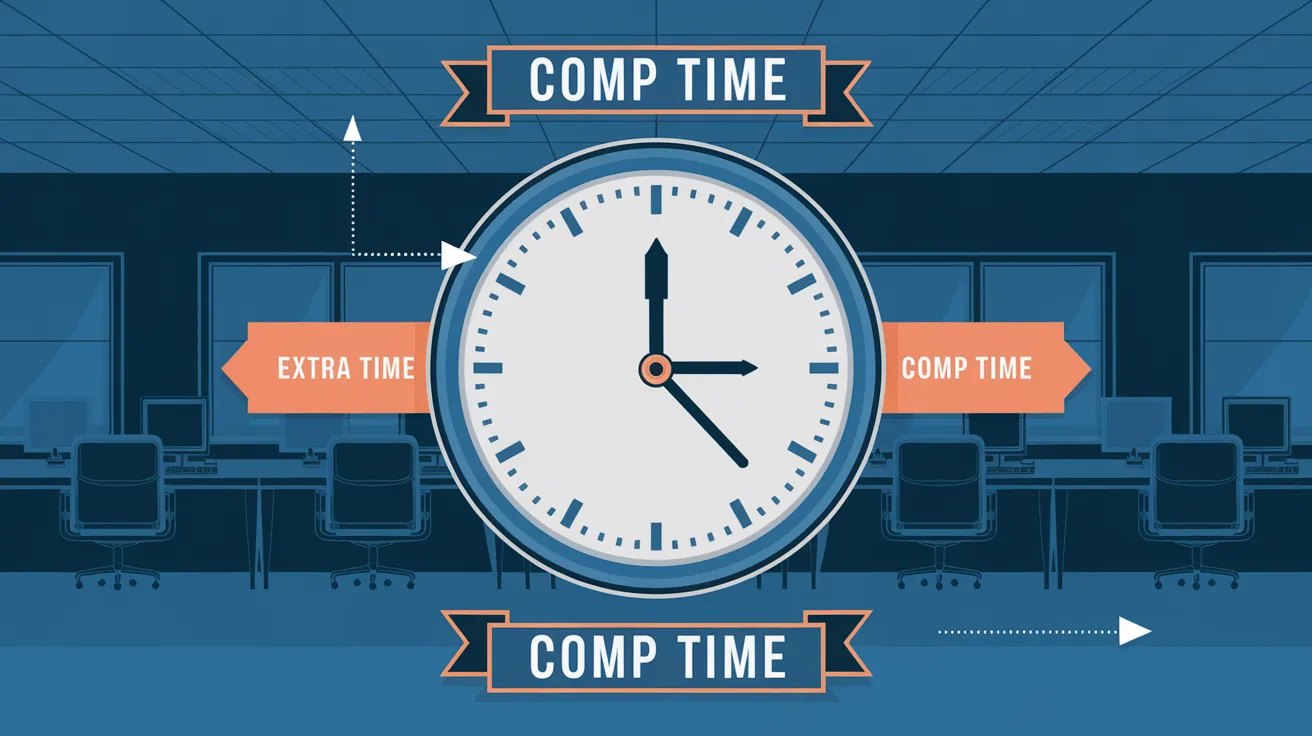
Compensatory time (or "comp time" for short) is a time off that employees get instead of overtime pay.
For example, if you work an extra four hours on a busy Thursday, your employer might give you six hours off another day instead of paying you overtime wages.
It's like a "time in the bank" system - you put in extra hours now and take them back later when things are slower.
While it's common in government jobs and some non-profits, most private companies can't legally offer comp time instead of overtime pay. They need to stick with paying time-and-a-half for those extra hours.
Yes, I know there is some confusion surrounding this topic. So, I decided to clear these out in detail.
In this blog, I will discuss:
- What is comp time
- How to calculate comp time
- Who is eligible for comp time
- Types and benefits of comp time (with application)
- Comp time vs. overtime (with legal considerations)
Let’s get to it.
What is Comp/Compensatory Time?
Comp time also known as compensatory time is a flexible work schedule for employees. It allows them to take extra time off for the hours worked beyond their regular time schedule instead of overtime.
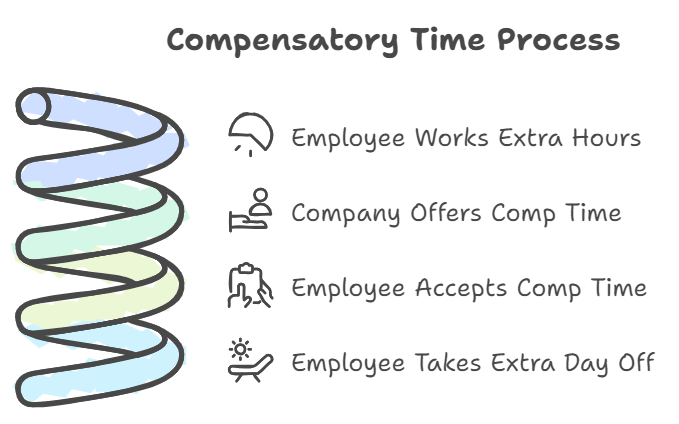
Let’s say you work 32-hour a week. One week you had to stay late to finish an urgent project. By the end of the week, you’ve worked for 40 hours.
Instead of an overtime rate, the company might offer you compensatory time—basically, extra paid time off. So, next week or whenever you want, you could take an extra day off.
It's a win-win for both employees and employers. Employees love it because they get more days off, and employers love it too, because it saves them money.
How to Calculate Compensatory Time
First, look at the hours you’ve worked beyond 40 in a week. These are what count for comp time. Now, multiply those extra hours by 1.5. That gives you the total amount of comp time you’ve earned.
Comp time = (Total work hours - 40) × 1.5
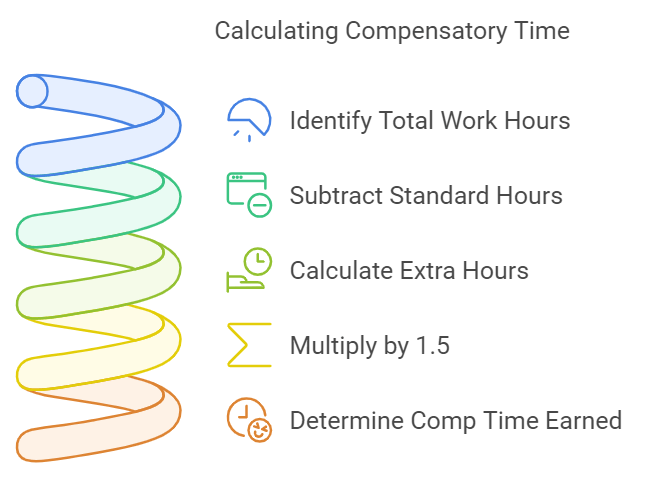
Suppose, you worked 50 hours, which is 10 hours over your standard 40 hours.
Extra Hours = 50 - 40 = 10 hours
Now, you multiply those 10 extra hours by 1.5 to find out how much comp time you’ve earned.
Comp Time = 10 × 1.5 = 15 hours
Who is Eligible for Comp Time Off?
Before you offer Compensatory time, you need to understand it’s allowed only for eligible employees:
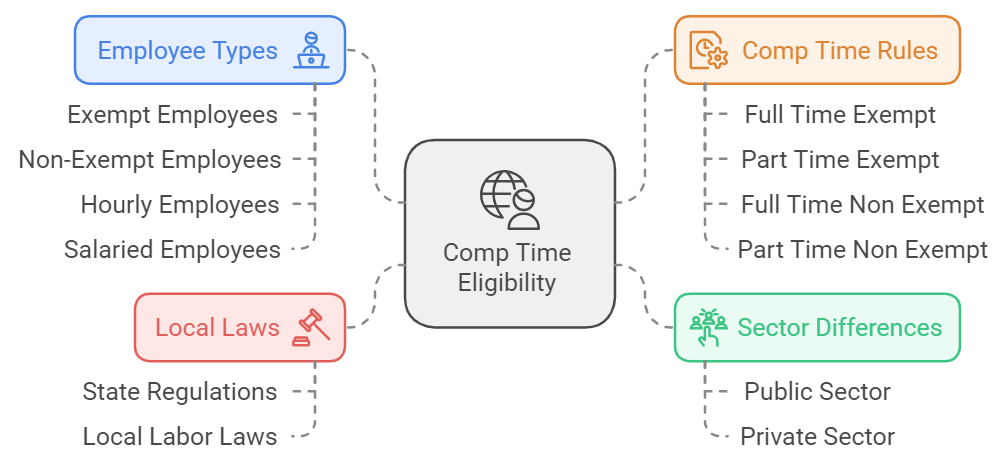
Exempt vs Non-Exempt Employees
According to the Fair Labor Standards Act (FLSA), if you’re exempt (not eligible for overtime or minimum wage), you don’t earn extra cash for those long nights at the office. In contrast, if you’re non-exempt (eligible for overtime and minimum wage), you get paid for every extra hour you work.
But exempt doesn’t always mean you’re salaried. If you hold an executive, administrative, or professional role and earn less than $684 a week, you’re still considered exempt.
Note: It can vary from country to country. Consider checking your country’s laws and regulations.
So, who’s eligible for comp time?
Generally, exempt employees can earn compensatory time if their company mandates overtime. For non-exempt employees, eligibility can vary based on your sector, local labor laws, and how you’re paid.
This table simplifies the whole thing:
Hourly Vs. Salaried Employees
Since salaried employees usually work under fixed schedules and pay, they typically aren't eligible employees for comp time. Unless the employers decide to convince them to do extra work.
And thus they will be eligible for compensatory time.
Now, if you're an hourly employee, you get paid for the amount of hours you work. So if you work more than your regular hours, you’ll get payment for overtime according to the law. So the question of comp time never arises here.
Aside from those, businesses can also offer compensatory time to remote employees under the specific conditions mentioned above.
Private vs. Public Sector Employees
If you work in the public sector, there are certain roles eligible for compensatory time. If you're in one of the social services industries, you can provide your team with the extra time. Some examples of public sectors that are eligible for comp time are:
- Social Services
- Doctors and Nurses
- Fire Fighters
- Law Enforcement
- Public Works
- Government Employee
But, it’s very strict for private companies. Most private sector employees don’t qualify for compensatory time unless local labor laws say otherwise.
Maximum labor laws require the companies to pay employees overtime over the comp time. However, some states let private employees use comp time instead of overtime. In Washington state, this is allowed if the employee agrees.
It’s a good idea to cross-check your state’s rules and regulations.
Types of Compensatory Time
There are several types of comp time and it all depends on where you work, what you work, and how you work.
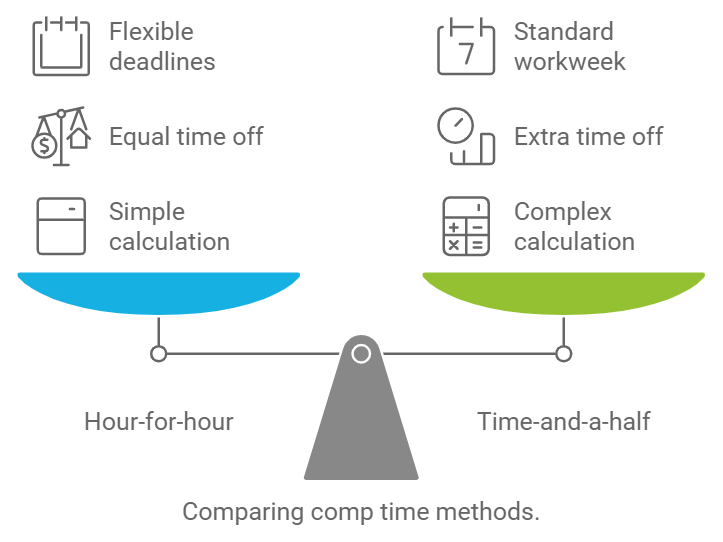
Hour-for-hour comp time
This is pretty simple. You earn additional time off equal to the time you have overworked. It works well if your job doesn't usually have tight deadlines.
Employers often follow this method to let their employees enjoy a work life balance. For example, if you work 5 hours extra, you earn an additional 5 hours off work later.
Time-and-a-half Comp Time
It means that for every hour of overtime, you get 1.5 hours off. This is often applicable when an employee works more than 40 hours in a standard workweek.
It’s a common compensation practice in the United States, specifically for hourly employees.
Benefits of Compensatory Time
Compensatory time has several benefits for both employees and employers. Here are some of the advantages:
Benefits for Employers
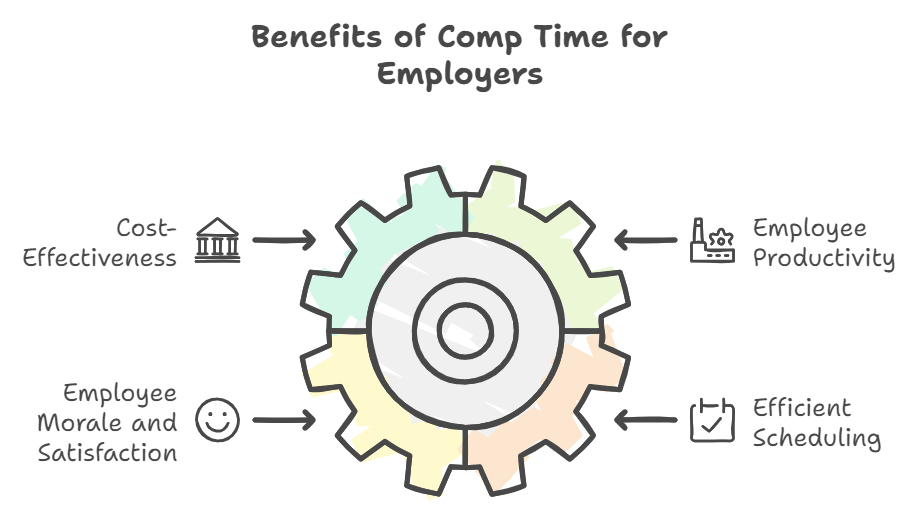
Cost-Effective
Comp time helps employers save their money by not giving overtime rates. It reduces the financial burden while still rewarding employees for their extra work. Small businesses or those with tight budgets can benefit from it.
Employee Productivity
When employees can take enough time off to recharge, they are more productive and motivated when they return. Productive employees can help employers in the long run.
Further Read: 11 Best Ways to Increase Employee Productivity
Increase Employee Morale and Satisfaction
Comp time shows employees that they are valued and appreciated for their extra effort. Thus it can increase employee morale and job satisfaction. Employees who feel appreciated are less likely to switch jobs.
More Efficient Scheduling
Comp time also helps employers to manage employee scheduling more effectively. I’ve noticed it helps you distribute work more evenly and prevents overworking employees.
So, you can enjoy a smoother workflow without relying on overtime hours.
Benefits for Employees
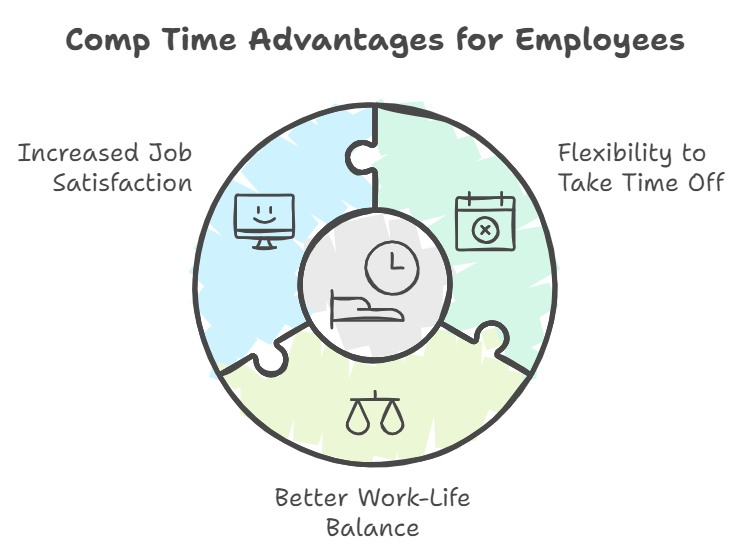
Flexibility to Take Time Off
One of the best parts of compensatory time is the flexibility it offers.
I’ve had times when taking a day off for personal reasons would have been tough without using vacation days.
With comp time, I could take a break when I needed it.
Better Work-Life Balance
Have you ever felt burned out but can’t afford to take a break?
Comp time allows you to step back and recharge without affecting your regular schedule. It maintains a healthier work-life balance, which has made a big difference for me.
Increased Job Satisfaction
When I can take the time off when I need it, it naturally reduces my stress. You’ll feel more satisfied and motivated at work, knowing you can take a break when overworked.
How to Track Comp Time Accruals and Usage
Tracking comp time may feel like a lot of work, but this is simple.
Most of the time, FLSA regulations and state overtime laws can make it hard to track time for it.
When I first decided to implement a comp time policy in my workplace, I quickly realized the importance of choosing the right tools. A good time-tracking software can make your work a lot easier.
Maintaining accurate records is crucial for complying with state and federal labor laws. So if you don't want to face any legal issues, it’s better to invest in reliable time-tracking software.
How to Implement Compensatory Time in the Workplace
If you are thinking of implementing comp time in the workplace, these are the steps you can follow:
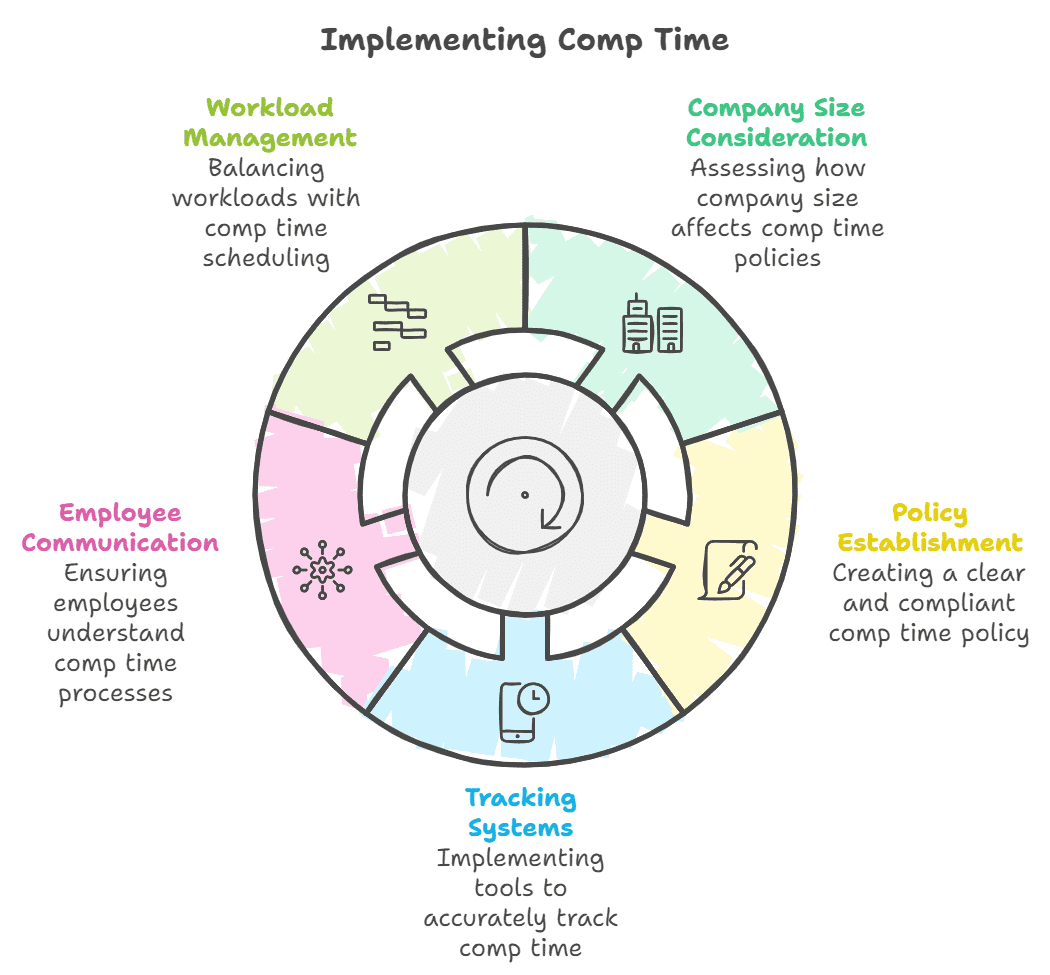
Consider Company Size
The first step is to consider what work your employees do.
Next, take a look at your industry. Sectors like tech or healthcare have specific regulations that affect how comp time should be structured.
Finally, assess the size of your company. There may be different approaches for different company sizes.
Establishing a Comp Time Policy
The next step is to create a compensatory time off policy.
This written agreement should clearly outline the rules and expectations for your employees. It will also specify how much comp time can be earned.
The agency policies clearly state the rate at which it is accrued.
For instance, one hour of comp time for every hour of overtime worked. Additionally, remember to consult legal guidelines to ensure compliance.
Tracking Comp Time
Accurate tracking of compensatory time is a must for maintaining fairness and transparency. Implement a reliable time-tracking system. Tools like Apploye can help you in this regard.
The time tracking will log the hours your employees work beyond their regular schedule easily.
Communicating to Employees
It’s vital to communicate the comp policy clearly to all employees. You can organize a meeting or training session to explain how it works.
Make sure everyone understands the process for earning and using comp time and that they feel comfortable.
Further Read: Best Virtual Team Communication Tools
Effective Workload and Schedule Management
You can implement a system to approve comp time in advance to manage workload and scheduling. This will help you plan for absences and ensure that there are always enough staff members available.
If someone is out on comp time, have another team member trained to cover their responsibilities. When you’re proactive in your planning, you can create a comp time policy for both employees and the organization.
Further Read: Workload Management - How to Master It
What are the Penalties for Comp Time Violations?
Penalties for compensatory time violations can change based on the jurisdiction and type of violation. Employers may face different penalties for comp time violations. These rules are enforced by the Department of Labor (DOL).
Some penalties for comp time violations are:
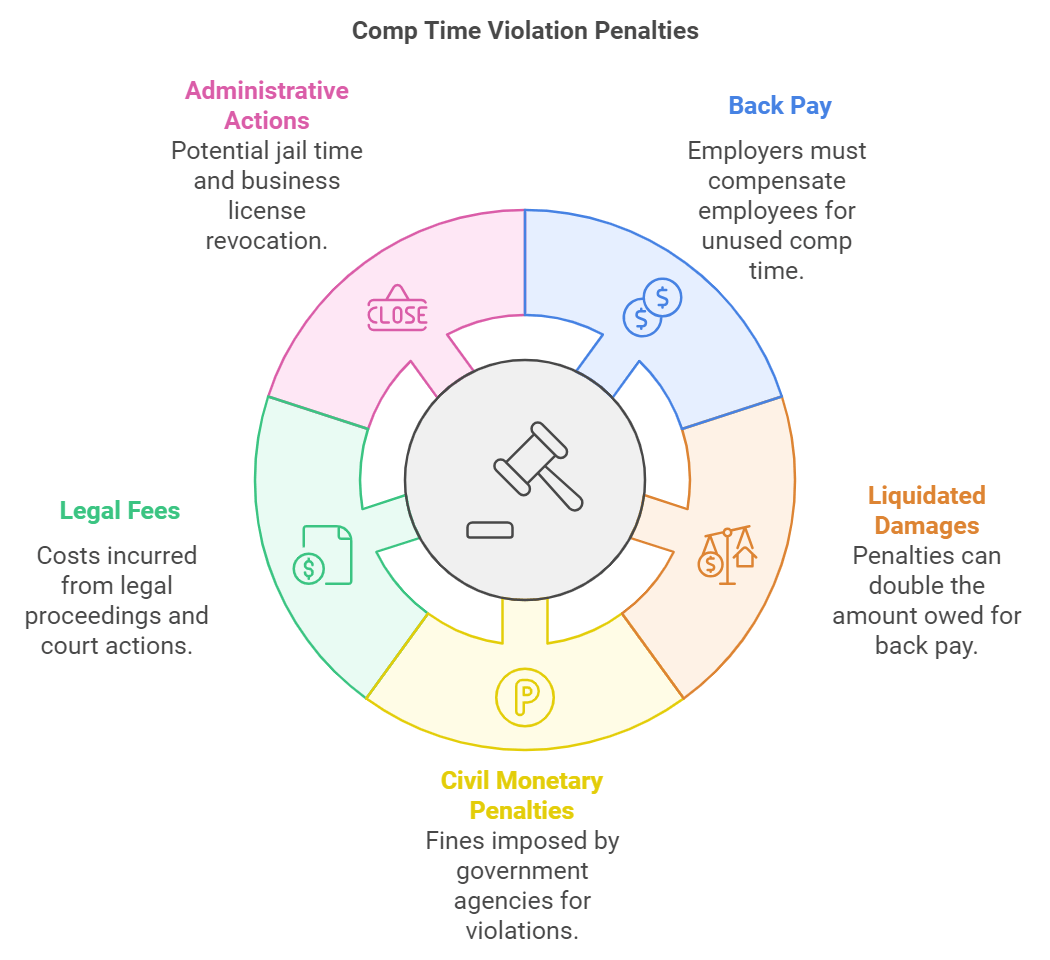
Back Pay
If you willfully don’t allow your employees to use their comp time properly, you’ll be fined up to $10,000. Moreover, you’ll be required to pay them the equivalent value of the time they earned but couldn’t use.
Note: Different countries might have different regulations.
Liquidated Damages
Now, if things get worse, employers need to pay liquidated damages. This can double the amount of back pay you owe. It’s meant to act as a penalty for not following comp time regulations properly, and it can add up.
Civil Monetary Penalties
In addition to back pay and damages, government agencies that enforce labor laws may also impose fines. These civil monetary penalties are a reminder to follow the rules closely.
Legal Fees and Court Costs
Courts can also step in and issue injunctive relief. This means you will need to change your company’s policies or practices. You must also make sure that your company follows the law in the future.
Administrative Actions
For repeated violations, government agencies can impose jail time and fines of up to $1,000 for each violation. They can revoke your business licenses or permits, creating serious trouble for your operations.
To avoid these, we suggest to follow comp time regulations closely. One of the easiest ways to stay on track is to track time using an automated system.
Comp time vs. Overtime: What are the Differences?
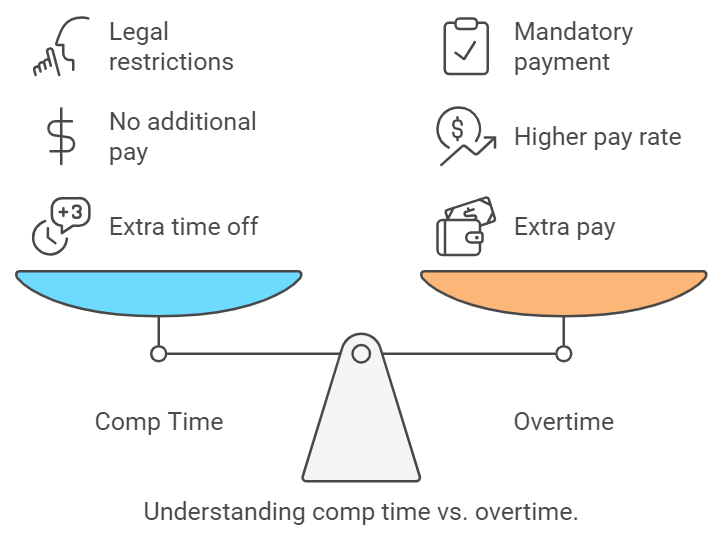
Many employees often don’t understand the basic difference between comp time and overtime. Moreover, they don’t even know that giving comp time instead of overtime breaks the Fair Labor Standards Act (FLSA).
That’s why we need to understand their differences.
Overtime is as simple as it sounds. You work extra and you get paid for it. According to the Fair Labor Standards Act (FLSA), eligible employees receive a 1 and ½ times the regular rate for working beyond 40 hours a week.
For example, if an employee worked 50 hours in a week and earned $18 per hour. They would get $27 per hour for the extra 10 working hours.
Now, compensatory time is a little different. Instead of getting paid extra, you get extra time off.
For example, the same employee who has worked 50 hours a week. In return, he would get 10 hours comp time without being paid extra.
But, of course, you don’t always have a choice.
The Department of Labor(DOL) requires most private employers to pay overtime instead of giving compensatory time. Even if your boss doesn't approve the extra hours, they still must pay you for overtime.
Compensatory Time Challenges and Limitations: What You Should Be Careful Of?
International Labour Organization reported over 745,000 people died from working 55 hours or more in a week.
While comp time hours have severe benefits, there are some limitations as well.
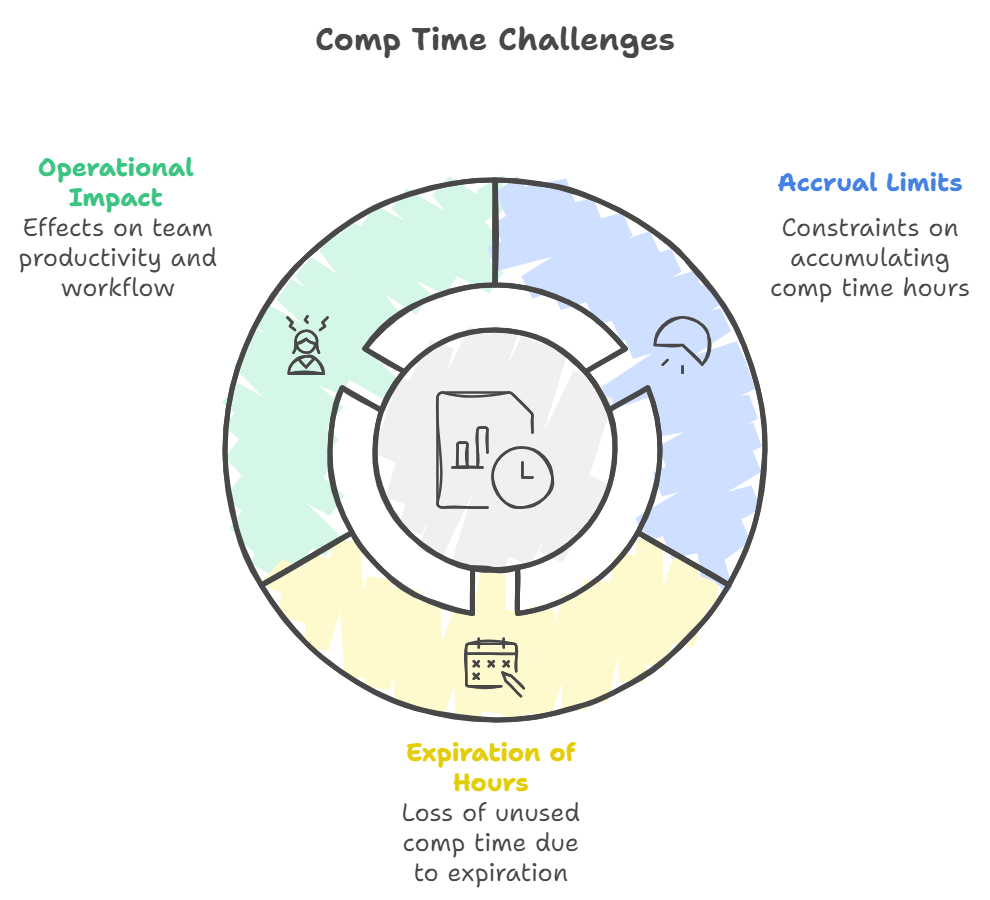
Limitations of Accrual Accounting
One of the most common problems is the accrual constraints. Comp time is earned over time based on the additional hours you put in.
But there are limits on how much you can accumulate. Despite working late and on weekends, employees can’t earn more comp time until they take some time off.
Expiration and Termination
Another issue is the expiration and termination of my accrued hours. It turns out that if you don’t use the comp time within a certain period, those hours will vanish. This puts extra stress on the workload.
Considerations for Operations
Many team members may request time off at once. In this time, management has to think about how their absence would impact productivity and workflow.
It can be hard to get approval for time off, and creates an imbalance. There may be a need to manage individual needs while being aware of the team's performance.
Conclusion
When you find a policy that benefits your business and your employees, you should take advantage of it. It will make your team feel appreciated and motivated, keeping your employees happy and building a strong company culture.
Time tracking tools like Apploye can help you stay updated about your employee's comp time. Thus you foster a culture where your employees feel valued.
After all, rewarding their hard work and allowing them to have a break increases morale and productivity.
FAQs
1. Can employers pay out compensatory time?
Yes, employers can pay for compensatory time. It depends on the laws and company policies. Some employers may offer payment for unused comp time. Others might ask employees to use it within a given period.
2. Is comp time legal?
Yes, comp time is legal in some cases. It depends on the local labor laws. In the U.S., it is usually allowed for public sector workers. But it is not allowed for most private sector workers. Still, you have to check your specific region’s/state’s labor law to know if it’s legal or not.
3. Can compensatory time expire?
Yes, but it varies by country. For example, in Spain, employees need to use their compensatory leave within four months after working overtime. In the U.S., they must use it within the next 26 pay periods.
4. What is comp time vs PTO?
Comp time is paid time off for working extra hours. It is often used instead of overtime compensation. PTO means paid time off, which is an amount of leave for employees. PTO can be vacation, sick days, and personal time.
5. Does compensatory time roll over?
Yes, compensatory time can roll over to the next pay period. For non-exempt employees, compensatory time expires at the end of the pay period. However, exempt employees must use their comp time within 26 pay periods.
Read More:
